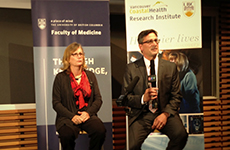
First study in the world to find high rates of venous narrowing in general population. Research results confirm that venous narrowing is not associated with multiple sclerosis.
Multiple Sclerosis (MS) is the leading cause of neurological disability in the world1. Canadians have one of the highest rates of MS and three Canadians are diagnosed with MS every day2. The disease randomly attacks the myelin coating of nerves in the brain, optic nerves and spinal cord causing permanent scaring. MS patients are in need for treatments that can make a difference in their quality of life — this is the driving force in health and medical research.
Initial reports indicated that all patients with MS have chronic cerebrospinal venous insufficiency (CCSVI), the narrowing of the veins leading from the brain to the heart. First put forth by Dr. Paolo Zamboni in Italy in 2009, the study claimed that MS is associated with CCSVI, and that some MS patients can be effectively treated by angioplasty to widen the veins. However, all prevalent studies have been limited to the imaging techniques of ultrasound without validation from catheter venography, which has the advantage of direct visualization of venous anatomy.

Dr. Anthony Traboulsee, director of the MS Clinic at UBC Hospital of Vancouver Coastal Heath and associate professor of Division of Neurology at UBC, uses the ‘gold standard’ imaging technique — catheter venography — to investigate the CCSVI theory by directly visualizing the veins of people with MS, their unaffected siblings and unrelated healthy research participants. The results, published in the U.K. medical journal The Lancet, confirm that venous narrowing is not a unique anatomical feature associated with MS.
Dr. Traboulsee’s research team, in collaboration with the University of Saskatchewan, calls into question the basis for a controversial theory that there is an association between venous narrowing and MS. 177 study participants enrolled in the study between January 2011 and March 2012. Traboulsee’s team found venous narrowing in 74% of people with MS, 66% of their unaffected siblings, and 70% of the unrelated research volunteers. “Our results confirm that venous narrowing is a frequent finding in the general population. This is the first study to find high rates of venous narrowing in a healthy control group as well as the first to show that the ultrasound criteria usually used to ‘diagnose’ CCSVI are unreliable,” says Dr. Traboulsee.
The research study addresses the need for carefully designed and high quality research technology and methodology to fully investigate new theories of MS.
Click here for the abstract of the article published in The Lancet on October 8, 2013.
REFERENCE:
1Multiple Sclerosis International Federation. What is MS? http://www.msif.org/about-ms/what-is-ms-1.aspx
2Multiple Sclerosis Society of Canada. About MS. http://mssociety.ca/en/information/default.htm


